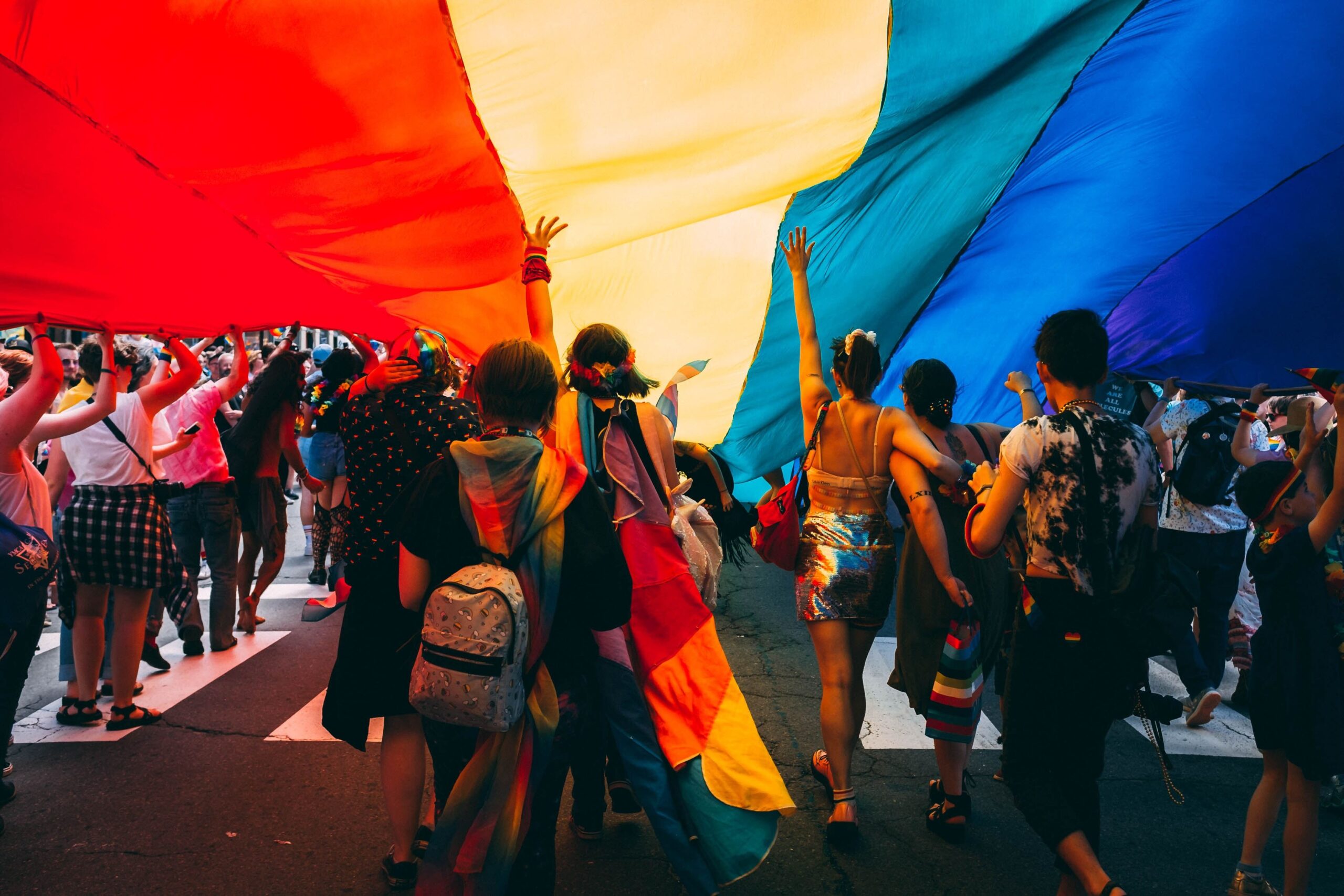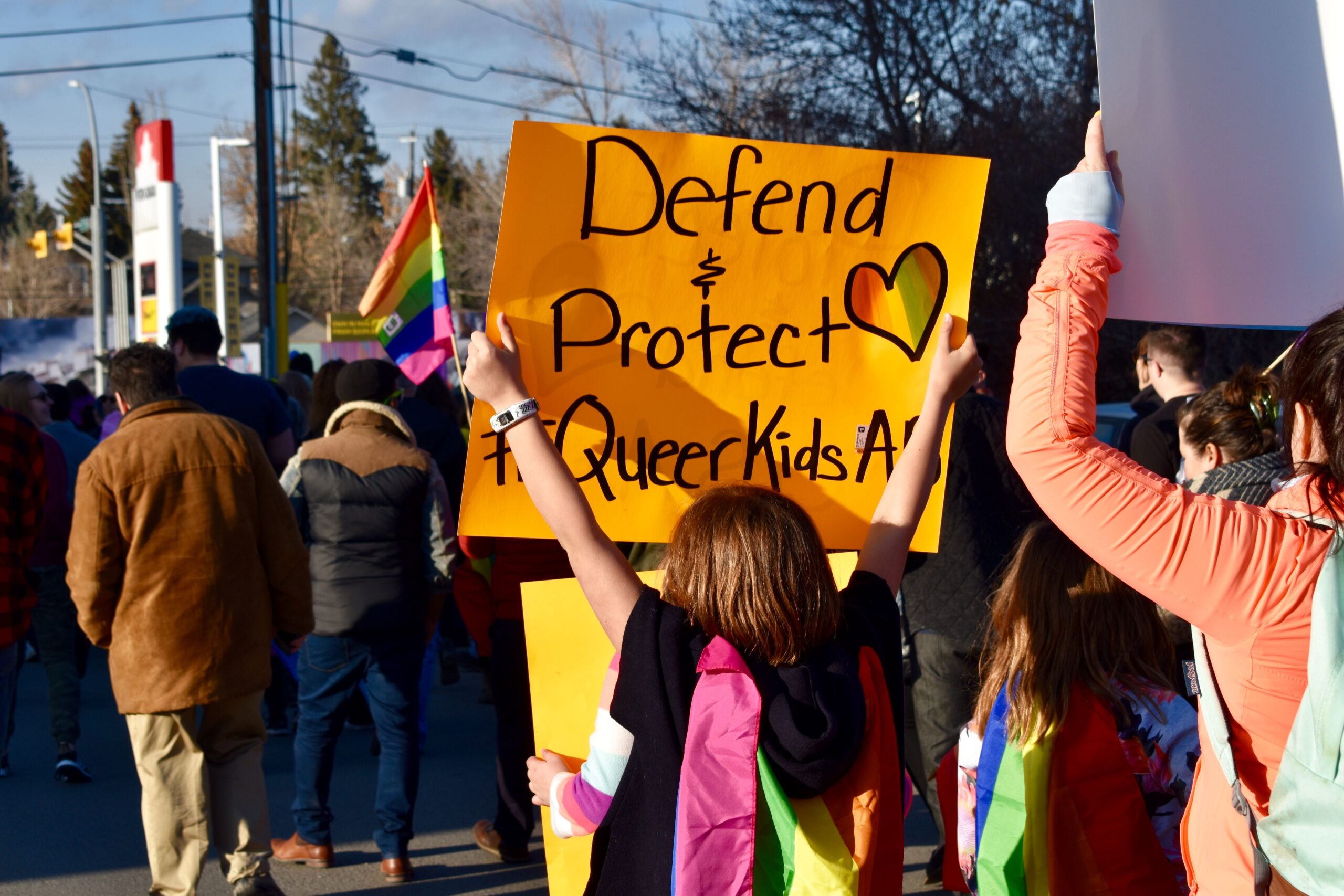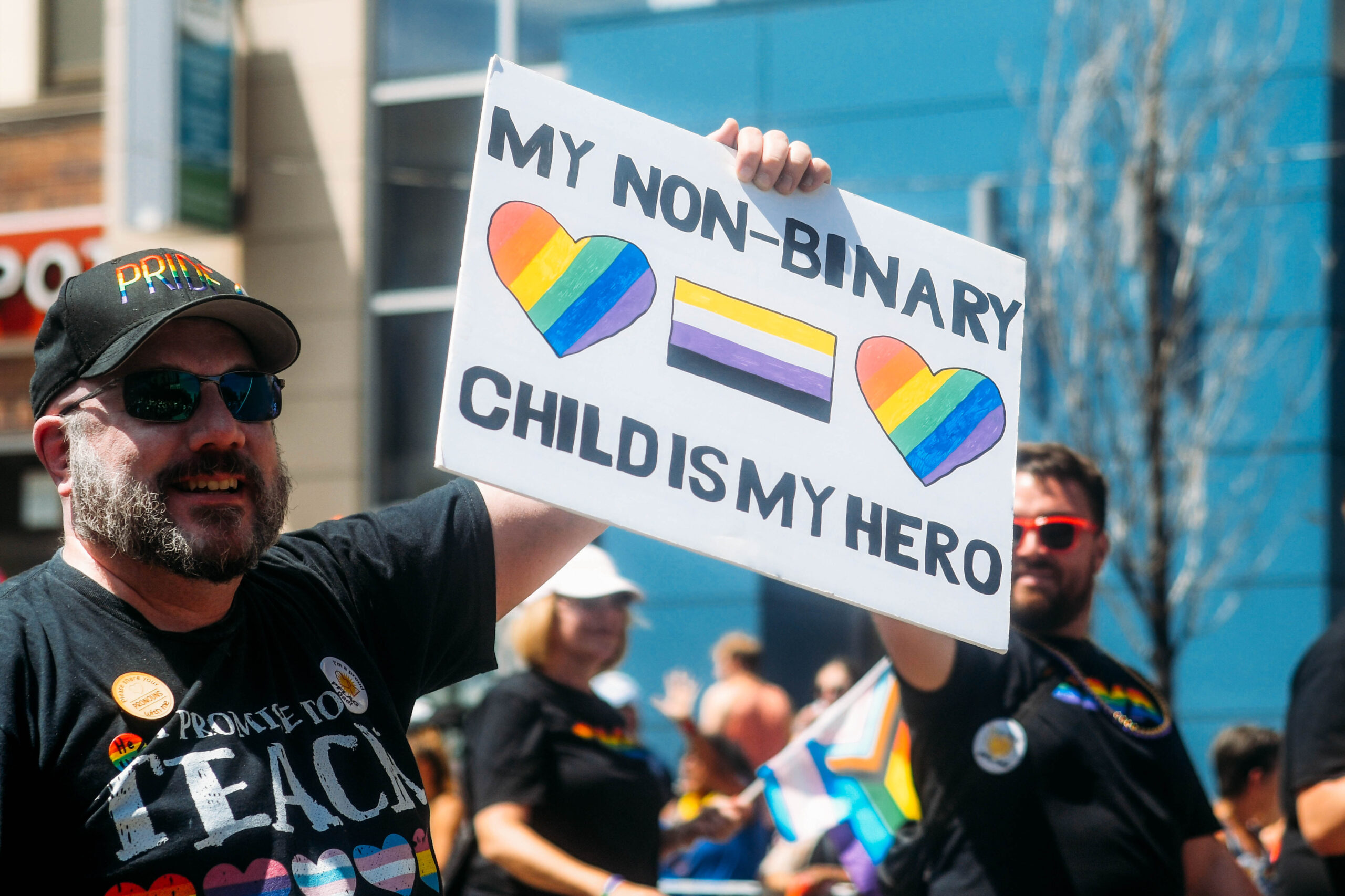[ad_1]
That is half two in a collection. You possibly can learn half one right here.
“It’s arduous to say what security would really feel like, as a result of we’ve by no means obtained to style it,” Adien Lyford stated of their queer group. They’re a queer, nonbinary pupil at a small-town, Midwestern college.
Lyford, of their early 20s, is the grandchild of a homosexual man. They grew up going to Satisfaction; after they got here out as bisexual to their mother, writer Julie Lyford, in center faculty, “My mother was like, ‘That’s nice, what would you like for dinner tonight? Lasagna?’”
Recently, nonetheless, they really feel intensifying dread. Consistently explaining their nonbinary id is exhausting. They’re apprehensive in regards to the barrage of anti-trans legal guidelines.
“I can’t deny that it will get actually arduous generally,” Lyford stated. On the similar time, “I’m not simply going to allow us to be harm. I refuse. I’m going to scream on the world till it hears me.”
The grownup kids of LGBTQ+ dad and mom and caretakers I spoke to expressed pleasure of their households and identities. However additionally they skilled stigma, from housing discrimination to social exclusion, that formed their lives.
Within the face of this, the youngsters of LGBTQ+ of us construct security for themselves and their family members each day. By means of community-building and protest, celebration and illustration, LGBTQ+parented folks make selections—usually with scarce assets, and bearing the trauma of systemic inequalities—to take care of themselves and each other past the cisgender and heterosexual nuclear household. In doing so, they declare house not simply to outlive, however to thrive.
Every day discrimination
Folks with LGBTQ+ dad and mom and caretakers expertise authorized, social, and financial discrimination. This contributes to what social scientists name minority stress: the sustained trauma of being a marginalized particular person.
Society inflicts heightened minority stress on transgender and bisexual folks in comparison with their cisgender and monosexual counterparts. Derek Siegel, a sociologist researching trans parenthood on the College of Massachusetts, Amherst, stated many trans ladies they interviewed initially hesitated to develop into dad and mom as a consequence of fears of discrimination.

Institutional racism additional harms LGBTQ+ Black and Indigenous folks and different folks of colour. They’ve much less entry to materials and therapeutic assets than their white and rich counterparts. The kids of queer dad and mom, notably these of colour, usually tend to stay in poverty or expertise financial anxiousness associated to discrimination.
Brittnee Gauthier is now in her early 30s, and works as a licensed marriage and household therapist in California. Her homosexual father was within the U.S. Air Power underneath “don’t ask, don’t inform,” which banned LGBTQ+ members of the army till 2011. As kids, she and her sister needed to preserve their father’s sexual orientation hidden for worry the army would discharge him and so they’d lose their housing. This contributed to a “nerve-wracking” sense of secrecy, Gauthier stated.
Institutional discrimination in opposition to LGBTQ+ households usually prevents them from acquiring social and medical assist, notably harming LGBTQ+ relations with disabilities. In the meantime, in social settings, LGBTQ+ dad and mom and their kids usually conceal their household constructions out of worry for his or her security.
“One of many largest moments that this got here up for me is in childhood, when my mom was a volunteer with our Boy Scout troop,” stated Kenji Kuramitsu, a Chicago-based therapist and board member of COLAGE, a nationwide group that helps the youngsters of LGBTQ folks. He’s the bisexual son of a lesbian mom.
The Boy Scouts banned queer adults from volunteering primarily based on false and dangerous propaganda that queer and trans individuals are extra prone to abuse kids. LGBTQ+ individuals are no extra prone to abuse others than straight and cis folks, however they’re extra prone to be abused, as a consequence of pervasive discrimination. Kuramitsu stated his father or mother was “furious” in regards to the Boy Scouts’ bigotry, however she hid her id and volunteered with the intention to assist her son.
Experiences like this made Kuramitsu really feel like he had a “divided self,” he stated, referencing W.E.B. Du Bois’ idea of double consciousness.
“Within my home there was nothing extra regular than having homosexual dad and mom,” stated Jesse Sgambati, a queer and trans musician in his mid-20s who grew up in New York state. Outdoors the home, different kids bullied them for being the Black, adopted son of two white, homosexual males. “It was undoubtedly arduous rising up,” he stated. “But it surely by no means made me ashamed. I used to be all the time vocal and proud to be the kid of queer dad and mom.”
Security issues form LGBTQ+ households’ life selections, together with about the place to stay. A current examine confirmed that 56 p.c of LGBTQ+ households in Florida are fascinated about transferring out of state; 17 p.c have already taken steps to take action.
Adrian Ogle, who’s queer and has a queer father or mother, was the previous board chair of COLAGE. He grew up in Florida, and he stated most of his queer childhood associates have moved away.
“We are going to most likely by no means return,” Ogle, who now lives in New York, stated. “It’s heartbreaking. It’s truly form of traumatic.”
Quite a few components stop LGBTQ+ households from transferring away from oppressive laws, together with deep-rooted ties to their properties and communities.
Many households lack the financial means to maneuver. Courts usually impose mobility restrictions on LGBTQ+ of us who’ve been incarcerated. LGBTQ+ immigrants, notably those that are undocumented, face hurdles primarily based on citizenship standing, stated Nadine Nakamura, a psychology professor and LGBTQ+ immigration skilled at Alliant Worldwide College. In the meantime, colonialism violently dispossesses Two Spirit and broader Indigenous communities from their land, whereas harming conventional gender programs.
Cultivating group
Researcher Henny Bos’ evaluation of the information on lesbian-parent households repeatedly finds “no vital variations” within the psychological well-being of the youngsters when in comparison with different kids in the USA, regardless of their experiences of discrimination, she stated.
Bos is a professor at College of Amsterdam and co-investigator of the Nationwide Lesbian Longitudinal Household Research, which has adopted a gaggle of individuals in the USA with lesbian dad and mom for the reason that Eighties. An evaluation of 16 research on LGBTQ-parent households discovered comparable outcomes to Bos’.
“The children are alright,” Bos concluded.
This well-being is the results of communities taking care of each other, constructing solidarity to entry assets and create change. That affirmation doesn’t erase the trauma of discrimination, but it surely permits kids to thrive regardless of it.
“There may be a whole lot of resilience in these households,” Bos stated.
Recently, Bos has been considering shifting her analysis inquiries to focus much less on evaluating queer households to straight ones, and extra on LGBTQ+ households’ distinctive strengths.
It’s a shift in considering Kuramitsu echoes. Whereas he’s grateful for the work organizations like COLAGE have accomplished to normalize queer households, “there can also be one thing actually distinctive, an actual reward to carry to the world in our variations,” he stated.
Researchers have discovered that LGBTQ-parented folks are usually uniquely community-oriented and open-minded, and have sturdy relationships with their dad and mom in comparison with non-LGBTQ-parented folks. Siegel, the sociologist, emphasised the resilient bonds of pleasure and care that trans moms create with their kids.

Youngsters of LGBTQ+ dad and mom expertise higher well-being after they have entry to the assets to fulfill their primary wants—and when they’re extra linked to queer group areas and affirming schooling.
The primary time Kuramitsu went to a COLAGE assembly, “it was like strolling right into a room the place folks have been talking a language I didn’t understand I spoke,” he stated.
Olivia Bartholomaei first linked with COLAGE by a penpal program when she was 8 years previous. Now a COLAGE volunteer in her early 20s, she finds pleasure in supporting a youthful technology of youngsters with trans dad and mom.
“It’s life-changing, not only for me, however the children, after they have that lightbulb of realization: ‘Wow, we’re the identical,’” she stated. “They’re so full of pleasure. They love their dad and mom a lot. They love having two mothers or a trans dad.”
For older generations of queer-parented folks, discovering group was harder. Theater artist and writer Julie Lyford—Adien’s Lyford’s mother—grew up with a homosexual father in Iowa. After her father got here out within the Seventies, Julie’s mom marketed within the newspaper to kind a assist group of different spouses and exes of homosexual folks. Lyford is founding father of a gaggle for older COLAGE members.
Juile Lyford’s childhood greatest pal ended the friendship after studying Julie’s day was homosexual. And after her dad got here out, homophobes vandalized his workplace. So Julie developed methods to display folks for security. When relationship males in faculty, she would counsel that she and her date watch a gay-themed film.
“I’d gauge from their response whether or not this is able to be a one-date particular person,” Julie stated.
Many queer and trans of us with LGBTQ+ dad and mom and grandparents kind notably highly effective bonds with their queer elders.
Whereas many white dad and mom of children of colour hurt their kids by overt racism or by pretending to not “see” race, Sgambati stated their dad and mom linked them to Black group areas.
“They weren’t simply oblivious to the truth that adopting a Black youngster brings with it its personal set of circumstances,” Sgambati stated. “They actually confirmed up.”
When Sgambati got here out as trans in center faculty, his fathers supported him unconditionally. They helped him entry gender-affirming care.
“There was by no means a second after I felt that I couldn’t discuss to them about it,” Sgambati stated. “To not brag about my dads all day, however they’re nice.”
One in every of Sgambati’s dads, Jack Stevens, died in 2014. Sgambati is pleased with Jack’s legacy as the primary homosexual father or mother to finish a second father or mother adoption of their county.
Ogle attracts power from supportive, multigenerational relationships inside his Black communities.
“With a historical past of oppression and racism, we’ve solely had our kin to depend on,” he stated. Ogle credit his queer mother for opening potentialities for him. “My mother is offering a basis for me to be extra open, to be extra of myself sooner,” he stated.
For a lot of, love of group naturally interprets to activism.
When Adien Lyford noticed a person waving a homophobic sign up entrance of their college’s campus through the fall of their freshman 12 months, they began an impromptu protest that grew to become a daylong solidarity sing-along. By night, Lyford had joined the faculty Gender and Sexuality Alliance; this 12 months, they’re GSA co-chair. Their mom Julie stated listening to about Adien’s protest was “one of many largest proud mother moments.”
However security just isn’t all the time simple, particularly when most of the establishments that declare to guard marginalized folks truly hurt them.
After I spoke with Adien in February, they have been busy organizing a drag present with their campus LGBTQ+ group. They have been apprehensive that, as in lots of drag occasions throughout the nation—which conservative lawmakers are more and more banning—transphobes will threaten contributors. They grappled with the way to preserve attendees and performers secure when the police often threaten LGBTQ+ communities.
And whereas they’ve been supportive to the folks I interviewed, nationwide LGBTQ+ nonprofits like COLAGE stay out of attain for a lot of kids of LGBTQ+ folks. Some interviewees criticized the inaccessibility of occasions, just like the yearly COLAGE convention in Provincetown, Massachusetts, a largely rich, white trip vacation spot. In response to those issues, COLAGE shall be internet hosting a convention in Atlanta this 12 months.
Main with pleasure
Lots of as we speak’s LGBTQ+ households will be open in ways in which Julie Lyford, rising up with a homosexual father or mother within the Seventies, couldn’t. And at the least for now, many have extra entry to authorized protections. Even Bartholomaei, in her early 20s, notes a optimistic distinction in transgender illustration from when she was a baby.
Particularly contemplating legislators’ elevated censorship of queer and trans expressions, many interviewees care deeply about illustration—Julie Lyford has even authored image books with a nonbinary youngster protagonist.

But Bartholomaei stated that, whereas essential, illustration just isn’t sufficient: “Illustration and visibility don’t equal liberation.”
Ogle expressed the same sentiment. Constructive illustration of LGBTQ+ folks, he stated, is “a strong instrument to form tradition, however generally I really feel prefer it may very well be sugarcoating to masks the structural issues which might be unaddressed.”
Amongst these structural points: escalating laws criminalizing take care of trans folks, and the carceral infrastructure supporting transphobic legal guidelines. That is one a part of what many name a bigger backlash in opposition to the justice actions of the previous few years, most notably the historic Black-led 2020 uprisings in opposition to policing, anti-Blackness, and institutional racism.
What’s extra, many authorized consultants, equivalent to LGBTQ+ household lawyer Michele Zavos, say the Supreme Courtroom’s ruling final June reversing Roe v. Wade suggests the Courtroom will overturn the 2015 resolution legalizing same-sex marriage.
“There’s little question in my thoughts,” Zavos stated.
Because of this hostile authorized local weather, many of us I spoke to feared for their very own and their household’s security.
“It makes me bodily sick,” Julie Lyford stated.
“Am I going to have to alter the way in which I current myself so my nation will acknowledge me as a human particular person?” asks Adien Lyford. “Regardless of all of this occurring, we’re not going to simply disappear. We’re right here, we’re queer, and we’re not going wherever.”
Moments of queer pleasure reinforce their resolve: Their GSA drag present in April 2023 was “unbelievable.” No transphobes confirmed as much as intimidate the group; the supportive turnout was “superb.”
In the meantime, the overwhelming majority of 2022 anti-LGBTQ+ payments—91 p.c—weren’t made into regulation, whereas 29 discriminatory payments handed, legislators additionally handed 24 payments supporting LGBTQ+ rights.
Ogle finds hope within the struggles of his elders. On the finish of our interview in Could 2022, Ogle mused that, in actions for marginalized folks’s rights, it all the time appears “we take a pair leaps ahead, we take a pair leaps again.”
I spoke to Ogle on the cellphone mere weeks after Politico printed the leaked draft Supreme Courtroom opinion overturning Roe. Streets throughout the nation stuffed with protest.
“Life is difficult, proper? Justice just isn’t linear,” Ogle stated. “Sorry, I’m truly getting a bit of emotional.”
He paused.
“I’ve to remind myself there’s a lengthy journey to these things,” Ogle stated. “Our ancestors have been right here, and actually have handled a few of the points we’re coping with now.”
We didn’t know—although we may most likely guess—that Roe would certainly be overturned a month later. We didn’t know—although we may most likely guess—that laws criminalizing of us’ entry to public areas, care, and our personal histories would solely intensify within the coming 12 months.
Ogle does know, nonetheless, that queer households—in essentially the most expansive sense of the phrase—have all the time asserted their proper to a world the place marginalized folks can do extra than simply endure.
“The factor that makes our communities—what I wish to consider—all the time come out on prime is that we middle pleasure in every part we do,” he stated.
Ray Hobbs contributed editorial suggestions as a sensitivity reader.
[ad_2]
Source link



